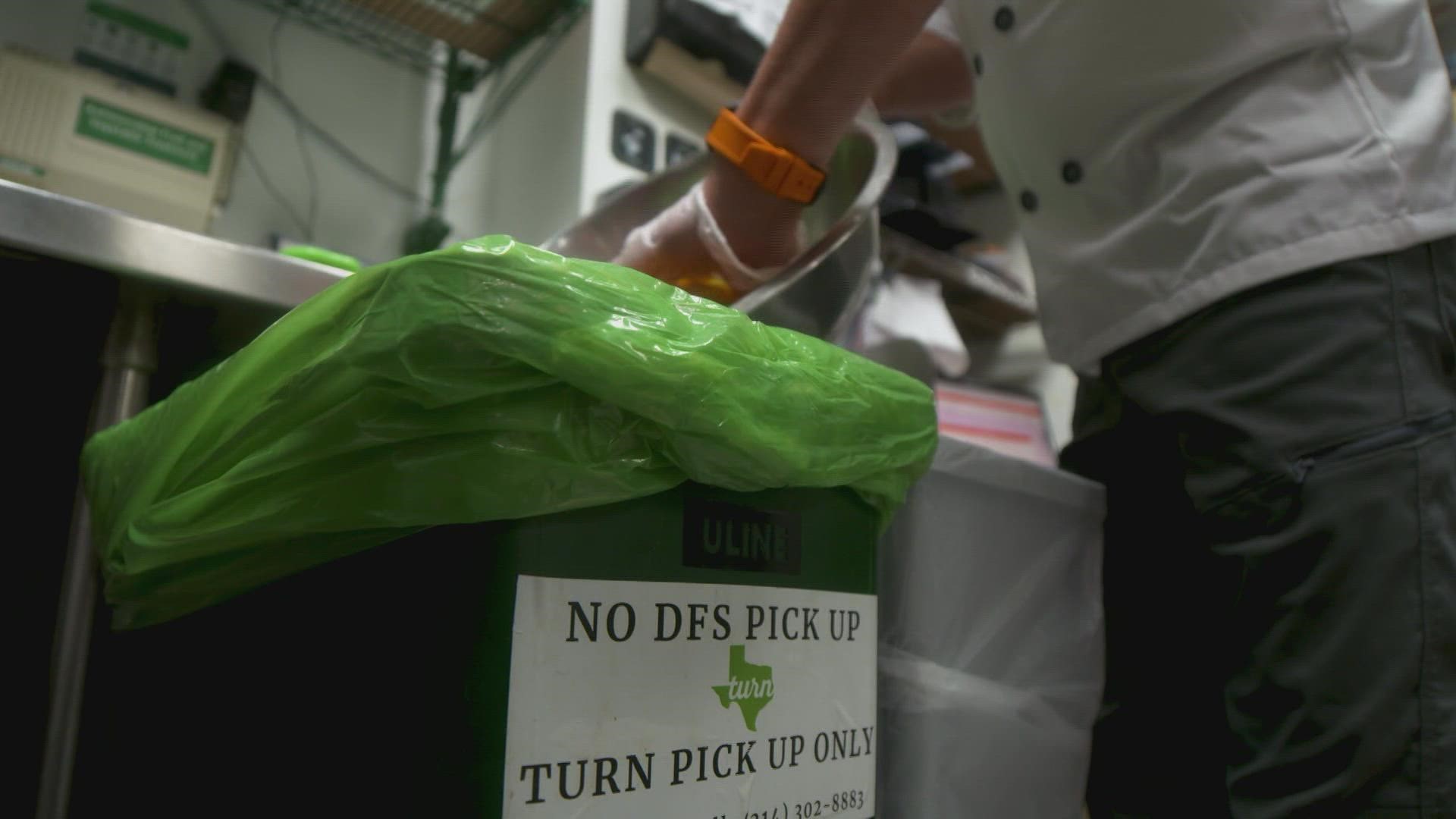FORT WORTH, Texas — Every passenger at DFW Airport generates, on average, one pound of trash.
The airport calculated its terminals have annually added about 32,000 tons of solid waste to North Texas landfills.
About a quarter of that waste used to be organic -- things like food scraps that are not really trash.
The airport launched a small pilot program in one terminal A restaurant in 2021.
Turn, a Dallas-based composting company, trained the kitchen and wait staff at Lorena Garcia’s Tapas Y Cocina to put real trash into a regular trash can, but separate their food waste by scraping all of it into a green bucket.
That’s all the restaurant staff had to do.
Turn employees did all the rest – picking up the buckets daily, emptying them, transporting them to a facility, composting the contents and turning it into fertilizer for local landfills.
Once other kitchens in other restaurants saw how easy it was, the DFW Airport program took off.
“We’ve grown exponentially,” said Lisa Roark, Turn program manager. “We are now in 25 different restaurants in three terminals and we are acquiring more every day.”
DFW Airport says more than 100 tons of trash have been diverted from local landfills.
“I wish people could understand how big of a difference that is,” said Turn’s Carrie Bolton.
The North Central Texas Council of Governments says 10.8 million tons of waste went to local landfills in 2019.
Out of 24 regions in Texas, North Texas sent the most trash to landfills.
If that rate continues, NCTCOG estimates that local landfills will be full in 35 years.
“We can no longer be a society that takes. We’ve got to be a society that puts things back into the cycle again,” Roark said.
She admits that she wasn’t sure the composting program would catch on at the airport
“As a chef and as someone who speaks chef, I know how chefs are sometimes just in the mood for speed. We are not in the mood for composting and recycling and doing all that different stuff,” she said.
“But I couldn’t be more wrong. They were all about it.”
It’s a simple process that’s easy to get used to, Bolton said.
Restaurant staff members just have to remember to scrape their scraps – even meat, dairy, oil – into the green receptacles Turn puts in their kitchens.
The program has grown faster than the airport anticipated, according to Ken Buchanan, executive vice president of revenue management and customer experience at DFW Airport.
“We have a zero-waste goal by 2030,” Buchanan said, “and there’s no way we can achieve that goal without this element of it.”
DFW was the first airport in North America and the largest in the world to achieve carbon neutrality.
In 2020, the airport received a United Nations Global Climate Action Award for its renewable natural gas efforts and all of the airport’s electricity comes from wind.
Any new restaurant or concession that opens at the airport must commit to taking part in the composting program.
“Airports are huge footprints,” Buchanan admitted. “We want to do our part to preserve the planet.”
RELATED: VERIFY: How realistic is zero waste?
Roark said there’s a cost saving to composting that many chefs appreciate.
She offers these general tips about cutting down on food waste at home:
- Don’t overbuy fruits and vegetables.
- Make a list and stick to it.
- Use the entire ingredient. For example, there’s no reason to peel a carrot, Roark says. Just wash it.
Finally, she suggests taking environmentally friendly practices one step further by not putting produce in the thin plastic bags supermarkets offer.
“Bananas are happy on their own,” she said.
DFW’s composting program should be operational in all five terminals by the end of the 2022.

